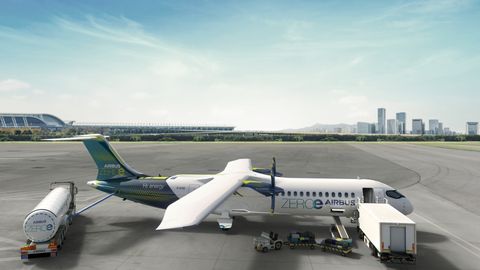Atlanta, 21 May 2024 – Airbus, Hartsfield-Jackson Atlanta International Airport (ATL), Delta Air Lines and Plug Power have joined forces to study the feasibility of a hydrogen-based hub at the world’s busiest airport in support of advancing a more sustainable future of travel. The study, which preliminarily launched earlier this year, will help define the infrastructure, operational viability, and safety and security requirements needed to implement hydrogen as a potential fuel source for future aircraft operations at ATL. It will also contribute to the understanding of supply and infrastructure requirements for hydrogen hubs at airports worldwide.
The use of hydrogen to power future aircraft could ultimately eliminate aircraft CO2 emissions in the air while also decarbonizing air transport activities on the ground – a top priority for all of the partners as they work toward the decarbonization of the aviation industry.
Airbus pioneers sustainable aerospace for a safe and united world. The company constantly innovates to provide efficient and technologically-advanced solutions in aerospace. Airbus is currently developing the first hydrogen-powered commercial aircraft with the ambition to enter into service in 2035. Airbus launched the “Hydrogen Hub at Airports'' program to jumpstart research into infrastructure requirements and low-carbon airport operations across the entire value chain. To date, agreements have been signed with partners and airports in thirteen countries including Canada, France, Germany, Italy, Japan, New Zealand, Norway, Sweden, Singapore, South Korea, Sweden, the United Kingdom and the U.S.
“The U.S. has easy and massive access to additional renewable energies to produce green hydrogen, and airports are looking for a diverse and balanced energy mix to be more resilient and help reduce the impact of aviation on the environment. Hydrogen is a key enabler for this,” said Karine Guénan, Airbus’ Vice President ZEROe Ecosystem. “The journey to prepare airport infrastructure to support hydrogen and low carbon aviation begins on the ground with pre-feasibility studies like this one, working with pioneer players like Delta, Plug and the world’s busiest airport.”
“Hartsfield-Jackson has long been a leader in the commercial aviation industry, and it only makes sense that we help lead this effort,” said ATL Senior Deputy General Manager Michael Smith. “If hydrogen proves to be a viable alternative, ATL will investigate options to update infrastructure needs in order to implement the new technology. We are thrilled to participate in this study and look forward to the results.”
As part of the study, ATL is providing the current airport layout plan and organization and will share updates on future developments and findings.
Plug Power is a leading provider of equipment and end-to-end, turnkey solutions for the global green hydrogen economy. The company is building an end-to-end green hydrogen ecosystem including the manufacture of electrolyzers, fuel cells and hydrogen facilities across the United States to decarbonize a variety of industrial, transportation and energy needs and applications worldwide.
“The potential to decarbonize aviation with green hydrogen is substantial,” noted Plug CEO Andy Marsh. “We are pleased to contribute our expertise in hydrogen infrastructure and applications development to this pioneering effort at Hartsfield-Jackson Atlanta International Airport. We have a ready-made supply of green hydrogen to support the airport from our new Woodbine, Georgia, production plant, the largest green hydrogen plant in the U.S.”
Delta is the largest airline operating at the world’s busiest airport, and offers one of the largest commercial airline schedules globally. It has been a core partner in the Airbus ZEROe program since 2022, when it signed on to provide expertise to identify fleet and network expectations, and the operational and infrastructure requirements needed to develop commercial aircraft powered by hydrogen fuel. Delta’s Chief Sustainability Officer Amelia Deluca said this study is part of Delta’s ongoing commitment and that no one company can solve the industry’s sustainability challenges alone.
“All aviation stakeholders need to explore new paths in every direction today for the industry to achieve a more sustainable future of travel by 2050,” she said. “While we work to scale sustainable aviation fuel to power today’s aircraft, hydrogen is a key element to unlocking the decarbonized future of flight and the next generation of aviation. That’s why we are on this journey to help map the industry’s hydrogen blueprints with partners who share our passion for connecting the world.”
The study in Atlanta is scheduled for completion at the end of 2026.
Further information about the topic of hydrogen in aviation can be found at the following link.
@Airbus @Delta @ATLairport @PlugPowerInc #hydrogen #ZEROe #sustainability
Artist rendering of a hydrogen-powered ZEROe aircraft at Hartsfield-Jackson Atlanta International Airport.
Your media contacts
Contact us
Kristi Tucker
Airbus | United States
Andy Gobeil
Hartsfield-Jackson International Airport
Delta Air Lines
1-404-715-2554
Fatimah Nouilati
Plug Power
See more Innovation news
Continue Reading
Singapore to establish world’s first airport testbed for next generation propulsion…
Press Release
Innovation
Civil Aviation Authority of Singapore, CFM International and Airbus sign MOU to prepare the aviation ecosystem for next generations of aircraft
How Airbus is pioneering aircraft manufacturing with Titanium 3D printing
Web Story
Innovation

Recycled and ready
Web Story
Innovation

Expanding 5G connectivity with the Airbus UpNext SpaceRAN demonstrator
Web Story
Innovation

Driving innovation at Airbus Helicopters
Web Story
Helicopters


